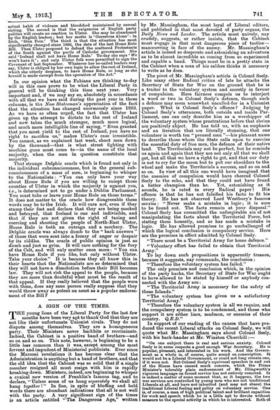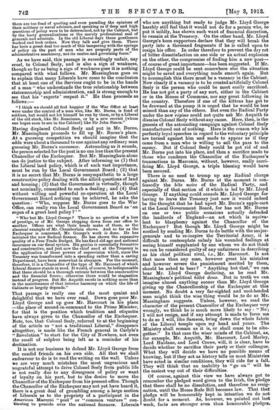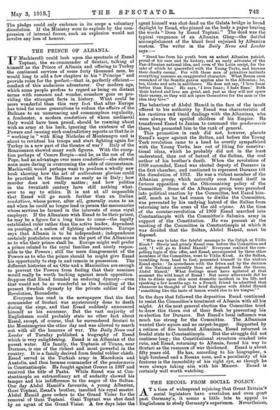A SIGN OF THE TIMES. T HE young lions of the
Liberal Party for the last few months have been very apt to thank God that they are not like their unfortunate Unionist rivals. They do not dispute among themselves. They are a homogeneous party. Their Ministers never backbite or recriminate. Indeed, the Cabinet is a positive band of brothers—and so on and so on. This note, however, is beginning to be a little less common than it was, except among the most fervent and impudent of Ministerial publicists. Ever since the Marconi revelations it has become clear that the Administration is anything but a band of brothers, and that the old idea that the Cabinet was so solid that if a single member resigned all must resign with him is rapidly breaking down. Ministers, indeed, are beginning to whisper a cynical new version of Franklin's famous tag, and to declare, "Unless some of us hang separately we shall all hang together!" In fine, in spite of bluffing and bold words there are abundant indications that all is not well with the party. A very significant sign of the times is an article entitled " The Dangerous Age," written by Mr. Massingham, the most loyal of Liberal editors, and published in that most devoted of party organs, the Daily News and Leader. The article most naively, nay crudely, suggests, or rather insists, that the Cabinet must engage in that most dangerous piece of tactics— manoeuvring in face of the enemy. Mr. Massingham's article is indeed so desperate and astonishing an adventure as to be almost incredible as coming from so experienced and capable a hand. Things must be in a pretty state in the Cabinet when a man of his calibre thinks it necessary to write as he does.
The pivot of Mr. Massingham's article is Colonel Seely. Like many other Radical critics of late he attacks the Secretary of State for War on the ground that he is a traitor to the voluntary system and secretly in favour of compulsion. Here fairness compels us to interject a word or two in Colonel Seely's defence, though such a defence may seem somewhat uncalled-for in a Unionist paper. What is Colonel Seely's offence ? Judging by Colonel Seely's utterances, both outside and inside Par- liament, one can only describe him as a worshipper of the voluntary system whose prostrations before that shrine are positively abject. He has told us, with an emphasis and an iteration that are literally stunning, that one volunteer is worth ten "pressed men "—his pleasant name to describe those whom the State calls upon to exercise the essential duty of free men, the defence of their native land. The Territorials may not be perfect, but he reminds us again and again that they are not only all that we shall get, but all that we have a right to get, and that our duty is not to cry for the moon but to put our shoulders to the wheel and make the Territorials a success, and so on and so on. In view of all this one would have imagined that the enemies of compulsion would have cheered Colonel Seely to the echo, and that they could not have found a better champion than he. Yet, astonishing as it sounds, be is rated in every Radical paper ! His offence is that he has not falsified his facts to fit his theory. He has not observed Lord Westbury's famous maxim : " Never make a mistake in logic ; it is sure to be found out. The facts remain at your disposal." Colonel Seely has committed the unforgivable sin of not manipulating the facts about the Territorial Force, but stating them honestly, and so has made a mistake in logic. He has allowed premises to go unchallenged of which the logical conclusion is compulsory service. Hero are the premises in effect admitted by Colonel Seely.
"There must be a Territorial Army for home defence." "Voluntary effort has failed to obtain that Territorial Army."
To lay down such propositions is apparently treason, because it suggests, nay commands, the conclusion : "Therefore the voluntary system has failed."
The only premises and conclusion which, in the opinion of the party hacks, the Secretary of State for War ought to have allowed to be stated by himself or anybody con- nected with the Army are : " The Territorial Army is necessary for the safety of these Islands."
" The voluntary system has given us a satisfactory Territorial Army."
"Therefore the voluntary system is all we require, and the compulsory system is to be condemned, and those who support it are either liars, madmen, or enemies of their country. Q.E.D."
In support of our reading of the causes that have pro- duced the recent Liberal attacks on Colonel Seely, we will quote what Mr. Massingham says about Colonel Seely, with his back-hander at Mr. Winston Churchill :- " Oa one subject there is real and serious anxiety. Colonel Seely is in some respeots a good enough War Secretary. He is popular, pleasant, and interested in his work. And the Govern- ment as a whole is, of course, quito sound on conscription. It would not be a Liberal Government, or could not long remain one, if it were not. But Colonel Seely's equivocal speeches in and out of the House have caused much concern, which the Primo Minister's tolerably plain endorsement of Mr. Illingworth's vigorous language on forced service has not entirely removed. It is indeed a matter of some moment that, as it happens, the two war services are controlled by young men who are not traditional Liberals at all, and have not inherited (and may not share) the traditional Liberal feeling and policy on voluntary service. One is, of course, a man of high political talent and brilliant capacities for work and speech which he is a little apt to devote without measure to the special activity in which he is interested. Both of
them are too fond of quoting and even parading the opinions of their military or naval advisers, and speaking as if deep and high questions of policy were to be determined, not by the Cabinet, but by the hasty generalizations or the merely professional zeal of generals and admirals. In the old Liberal days these gentlemen worked and took orders. Now they talk and give them. There has been a great deal too much of this tampering with the springs of policy on the part of men who are properly parts of the administrative machinery, not its centre and governing force."
As we have said, this passage is exceedingly unfair, nay cruel, to Colonel Seely, and is also a sign of weakness, though so far as being a sign of weakness goes it is nothing compared with what follows. Mr. Massingham goes on to explain that many Liberals have come to the conclusion that at least one of the Services ought to be in the hands of a man " who understands the true relationship between statesmanship and administration, and is strong enough to see that his ' experts' respect it." He then proceeds as follows :— "I think we should all feel happier if the War Office at least were under the control of a man who, like Mr. Burns, is fond of soldiers, but would not let himself be run by them, or by a Liberal of the old stock, like Mr. Runciman, or by a new recruit (whom one hopes soon to see in the Cabinet) like Sir John Simon."
Having displaced Colonel Seely and put in Mr. Burns, Mr. Massingham proceeds to fill up Mr. Burns's place. At a guessing competition we should imagine that the odds were about a thousand to one against any ordinary man guessing Mr. Burns's successor. Astounding as it sounds, the person selected for the post is no one less than the present Chancellor of the Exchequer. But Mr. Massingham alone can do justice to the subject. Alter informing us (1) that the Liberal land policy, which is of such vast importance, must be run by the Local Government Board ; (2) that it is no secret that Mr. Burns is unsympathetic to a large constructive policy dealing with the allied questions of land and housing ; (3) that the Government is virtually, though not nominally, committed to such a dealing ; and (4) that -without willing and powerful co-operation at the Local Government Board nothing can be achieved, he asks the question: "Who, suppose Mr. Burns goes to the War Office, can really run the Local Government Board as an organ of a great land policy ? ' " " Who but Mr. Lloyd George ? There is no question of a loss of prestige, or of Mr. George stepping down from one office to another. Offices are what their heads make of them, as the classical example of Mr. Chamberlain shows. And so far as the Exchequer is concerned, Mr. George's work is done. He has initiated the new Radical finance. He has shown the expansive quality of a Free Trade Budget. He has fixed old age and national insurance on our fiscal system. His genius is essentially formative and constructive, and just now the chief need at the Treasury is the application of those powers of supervision -which, since the Treasury was transformed into a spending rather than a saving Department, have been somewhat in abeyance. For the moment, therefore, it is a Chancellor of the typo of Mr. Harcourt of which Liberal finance stands in need. It would, of course, be indispensable that there should be a thorough entente between the constructive and the financial forces ; otherwise there would be stagnation instead of progress. But Mr. Asquith excels in nothing more than in the maintenance of that interior harmony on which the life of Cabinets so largely depends."
That passage is really one of the most quaint and delightful that we have ever read. Down goes poor Mr. Lloyd George and up goes Mr. Harcourt in his place —the place of second-in-command to the Prime Minister, for that is the position which tradition and etiquette have always given to the Chancellor of the Exchequer. Note, too, that Colonel Seely, referred to at the beginning of the article as " not a traditional Liberal," disappears altogether, is made like the French general in Carlyle's " Revolution " to start for the City of Nowhere, not even the smell of sulphur being left as a reminder of his destination.
It is not our business to defend Mr. Lloyd George from the candid friends on his own side. All that we shall endeavour to do is to read the writing on the wall. Unless we are very much mistaken the most ungracious and ungrateful attempt to drive Colonel Seely from public life is not really due to any divergence of policy or want of loyalty on his part, but to the desire to move the Chancellor of the Exchequer from his present office. Though the Chancellor of the Exchequer may not yet have heard it, there is a great deal of grumbling among a large section of Liberals as to the propriety of a participant in the American Marconi " pool " or " common venture " con- tinuing to preside over the national finances. Liberals who are anything but ready to judge Mr. Lloyd George harshly still feel that it would not do for a person who, to put it mildly, has shown such want of financial discretion, to remain at the Treasury. On the other hand, Mr. Lloyd George's keen supporters declare that they will break the party into a thousand fragments if he is called upon to resign his office. In order therefore to prevent the dry rot of bitter dissatisfaction on one side or an actual explosion on the other, the compromise of finding him a new post— of course of great importance—has been suggested. If Mr. Lloyd George could be sent somewhere else the situation might be saved and everything made smooth again. But to accomplish this there must be a vacancy in the Cabinet. Now clearly if a vacancy is to be created artificially Colonel Seely is the person who could be most easily sacrificed. He has not got a party of any sort, either in the Cabinet or in the House of Commons, nor any great following in the country. Therefore if one of the kittens has got to be drowned at the pump it is urged that he would be less missed than any of the others. But even the Radical Party under the new regime could not quite ask Mr. Asquith to dismiss Colonel Seely without any cause. Here, then, is the genesis of the astounding campaign against Colonel Seely manufactured out of nothing. Here is the reason why his perfectly loyal speeches in regard to the voluntary principle are turned against him and made to appear as if they came from a man who is willing to sell the pass to the enemy. But if Colonel Seely could be got rid of and Mr. Burns put into his place, and then a sacrifice made to those who condemn the Chancellor of the Exchequer's transactions in Marconis, without, however, really sacri- ficing Mr. Lloyd George, a triple blessing would have been secured.
There is no need to trump up any Radical charge against Mr. Burns. Mr. Burns at the moment is con- fessedly the bete noire of the Radical Party, and especially of that section of it which is led by Mr. Lloyd George. If anything could console Mr. Lloyd George for having to leave the Treasury just now it would indeed be the thought that he had upset Mr. Burns's apple-cart at the Local Government Board, for has not Mr. Burns on one or two public occasions actually defended the landlords of England—an act which is equiva- lent to blasphemy against the Chancellor of the Exchequer ? But though Mr. Lloyd George might be soothed by sending Mr. Burns to do battle with the major- generals and to re-inspire the Territorial Army, it is difficult to contemplate calmly his wounded feelings at seeing himself supplanted by one whom we do not think we can be considered guilty of any unfairness in describing as his chief political rival, i.e., Mr. Harcourt. Is not that more than any man, however great his mistakes and however severe the punishment merited by them, should be asked to bear ? " Anything but that," we can hear Mr. Lloyd George declaring, as he read Mr. Massingham's political billet doux. But in truth we can imagine almost anything sooner than Mr. Lloyd George giving up the Chancellorship of the Exchequer at this moment. No doubt a very far-sighted and cool-headed man might think the wise thing would be to do as Mr. Massingham suggests. Unless, however, we read the character of the present Chancellor of the Exchequer very wrongly, we think he is much more likely to say : " No ; I will not resign, and if any attempt is made to force me to do so I will, like Samson, bring down. the whole fabric of the Liberal temple upon my head and yours. The Ministry shall remain as it is, or shall cease to be alto- gether." In that case the wiser minds of the Cabinet, as, for example, Mr. Asquith, Mr. Harcourt, Lord Morley, Lord Haldane, and Lord Crewe, will, it is clear, have to decide whether to sacrifice their party or their colleague. What they will decide we have no possible means of knowing, but if they act as history tells us most Ministries have acted in similar conditions, they will ride for a fall. They will think that an inability to " go on " will be the easiest way out of their difficulties.
Of course, against this view we have always got to remember the pledged word given to the Irish, the pledge that there shall be no dissolution, and therefore no resig- nation, until the Home Rule Bill becomes law. That that pledge will be honourably kept in intention we do not doubt for a moment. As, however, we pointed out last week, facts are stronger even than honourable pledges. The pledge could only embrace in its scope a voluntary dissolution. If the Ministry were to explode by the com- pression of internal forces, such an explosion would not involve any loss of honour.




















































 Previous page
Previous page